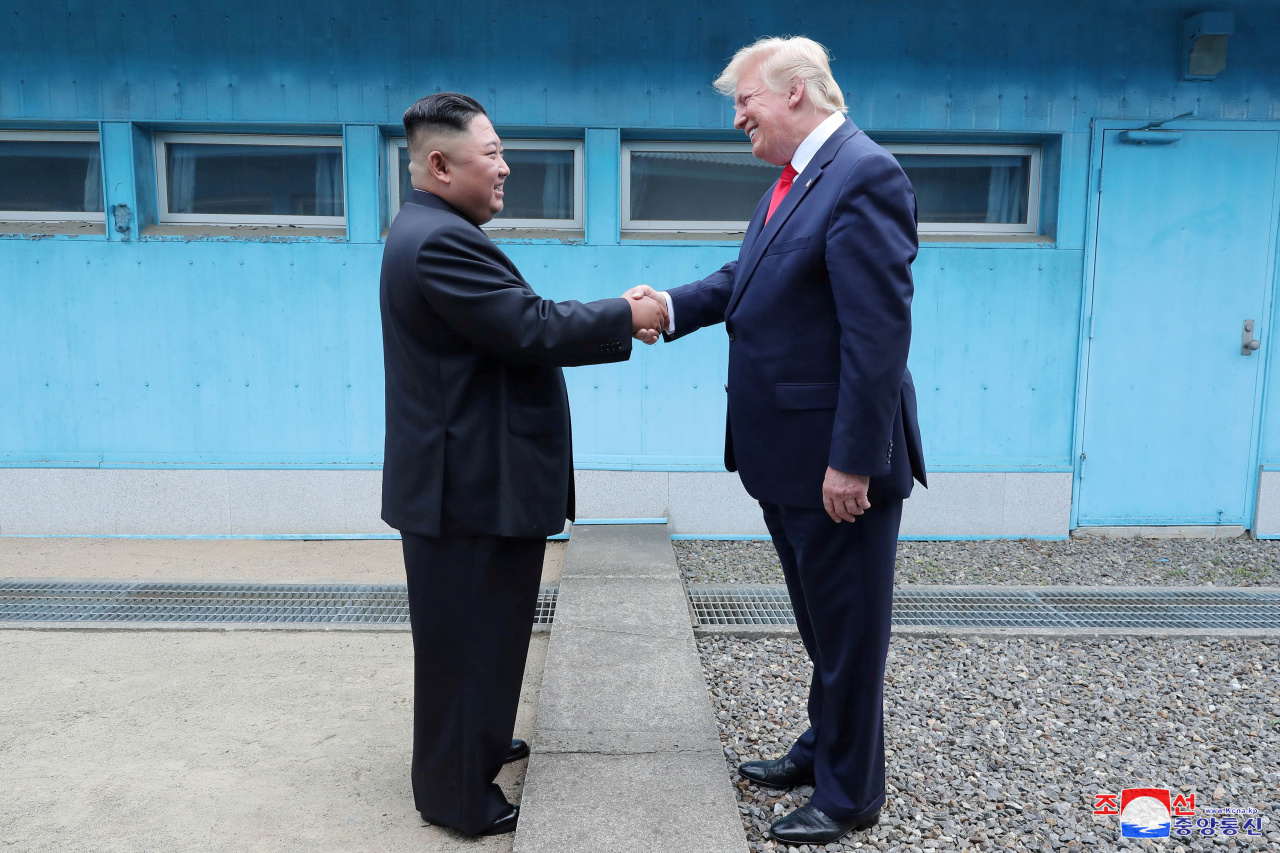[News analysis] Experts skeptical of Moon’s claim of de facto end-of-war declaration between US, N. Korea
By Park Han-naPublished : July 4, 2019 - 17:50
Debate has been sparked among experts over President Moon Jae-in’s recent remarks that the US and North Korea have effectively agreed to end the Korean War with the recent meeting of their leaders at Panmunjom.
On Sunday, US President Donald Trump and North Korean leader Kim Jong-un created fresh momentum for stalled denuclearization talks with symbolic gestures, such as shaking hands on the North’s side of the Demilitarized Zone separating the two Koreas and then crossing together to the South’s side.
On Sunday, US President Donald Trump and North Korean leader Kim Jong-un created fresh momentum for stalled denuclearization talks with symbolic gestures, such as shaking hands on the North’s side of the Demilitarized Zone separating the two Koreas and then crossing together to the South’s side.

They held a meeting for about an hour at Freedom House, a building on the southern side of the truce village of Panmunjom, and agreed to resume working level-talks on a denuclearization deal.
Describing the meeting as having ushered in “the beginning of a full-fledged peace era,” President Moon said in a Cabinet meeting Tuesday, “Although they did not sign any document, their action was tantamount to the de facto declaration of an end to hostile relations.”
Some local media outlets interpreted the president’s remarks as his view that Washington and Pyongyang have now declared an end to the 1950-1953 Korean War, which was halted only with an armistice.
Senior Presidential Secretary for Civil Affairs Cho Kuk had also called the Trump-Kim meeting “a historic day that practically declared an end of the war,” on his Facebook account Sunday.
Given that the US general representing the United Nations Command and a North Korean general representing the Korean People’s Army and the Chinese People’s Volunteer Army signed an armistice 66 years ago at Panmunjom, the crossing of the Military Demarcation Line does appear to have diplomatic and political significance.
However, opposition parties and analysts have criticized Moon for overstating the significance of Sunday’s meeting, asserting that it still has not yielded any substantive progress in the North’s denuclearization.
Sohn Hak-kyu, the head of the minor opposition Bareunmirae Party, said that Moon was being overly optimistic in effectively assessing actions by Trump and Kim as a declaration of an end to the Korean War.
“In light of the complexity of the North Korean nuclear issue, the end-of-war declaration and peace on the Korean Peninsula cannot be realized merely by the fact that US President Trump has stepped onto North Korean soil,” he said Wednesday.
Moon has advocated an end-of-war declaration to build trust between Washington and Pyongyang and persuade the North to move toward giving up its nuclear weapons.
The Moon administration initially pushed for a trilateral agreement by South Korea, North Korea and the US for the declaration, but has since changed course to forge two separate bilateral agreements -- one between the two Koreas and the other between the US and North Korea -- after facing strong opposition from US hawks.
Seoul, for its part, signed a military agreement with Pyongyang in September last year to cease all hostile acts against each other, which the North Korean leader and South Korean officials touted as tantamount to a nonaggression treaty.
“A de facto agreement is good. But what we can call a declaration is a de jure agreement that requires an official statement, said Kim Jin-a, research fellow at the Korea Institute for Defense Analyses.
The president’s remarks appear to emphasize the circumstances of the Panmunjom meeting and previous statements from the US aimed at overcoming tensions and hostilities between the two countries could be seen as a de facto agreement, she said.
“It seems like officials in Cheong Wa Dae hold a constructivism perspective, thinking that if these kind of messages (Moon’s remark) continue to accumulate, people will come to perceive it as reality,” Kim said.
But the signing of an official statement between Washington and Pyongyang would face steep political hurdles in the US, Kim said.
US officials and analysts have been expressing concerns that the North may demand the withdrawal of 28,500 US troops from the South when an end to the war is declared.
For the Trump-Kim meeting to be seen as an agreement on ending the war, there should have been messages regarding a peace regime on the Korean Peninsula, said Shin Beom-chul, director of the Center for Security and Unification at the Asan Institute for Policy Studies.
“It (the president’s remarks) was excessively optimistic. There was no comment on the armistice or how they would replace the armistice with a formal peace treaty,” he said.
Analysts said that discussions on a peace regime are unlikely to move forward when denuclearization is not making progress as the South and the US want the two goals to be achieved simultaneously.
Asked whether the US and North Korea discussed an end-of-war declaration when Trump and Kim met Sunday, a high-ranking Cheong Wa Dae official told reporters Wednesday that he would share more details on what took place at the meeting at the right time.
(hnpark@heraldcorp.com)











![[Today’s K-pop] BTS pop-up event to come to Seoul](http://res.heraldm.com/phpwas/restmb_idxmake.php?idx=644&simg=/content/image/2024/04/17/20240417050734_0.jpg&u=)





![[KH Explains] Hyundai's full hybrid edge to pay off amid slow transition to pure EVs](http://res.heraldm.com/phpwas/restmb_idxmake.php?idx=652&simg=/content/image/2024/04/18/20240418050645_0.jpg&u=20240419100350)

